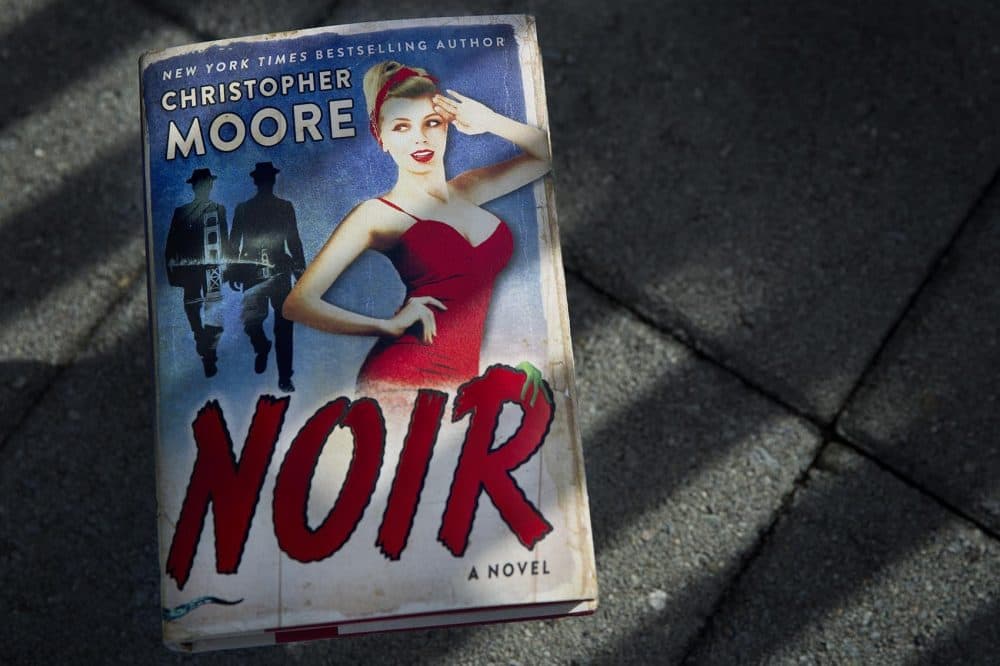Advertisement
Pushing Aside Political Frustrations, Christopher Moore Mined Humor For Pulp 1940s Universe Of 'Noir'

What is the hardest task a humoristic novelist faces when he wakes up every morning in the age of Trump?
If it’s Christopher Moore you’re asking, here’s the answer: “I don’t work in a vacuum and there was a lot of political turmoil in the world when I was writing this book.” His 16th novel, “Noir,” goes on sale Tuesday. “What was going on in the presidential election was so disturbing to me that I had to dial back my anger enough to write funny. The crafting of the language was hard. And if during the election I was a mess, I’ve been much more of a mess since the election.”
Moore, 60, has lived on the west coast for many years and in San Francisco, where “Noir” is set, for the past dozen. With the president fond of early-morning, assaultive, hyperbolic tweets, Moore says, “It’s already happened by the time I wake up. So, I try not to turn any machine on til at least I’ve had a cup of coffee and taken a couple of deep breaths and say here we go: ‘What did the a------ do today?’”

Nevertheless, Moore persisted and managed a deep dive into the fictional pulp universe he created in “Noir.” “I had to get out of that mindset,” he says recently, on the phone from his home. “I’ve got to turn the news off! This is just reprehensible!”
The result, Moore hopes, “is a book that is an escape for people who are in that right now.”
“Noir” is set in 1947. The broads and the dolls might be called “Toots” and they’re all swell. World War II is over, but crime and corruption are rampant. There’s an illicit, Chinese-run club, an Irish bully cop on the take and one of the city’s hot spots is a lesbian drag king club. There is a rather vicious, albeit logical and well-spoken, black mamba snake who enters the action midway through and will play a more central role than you might first think. (He’s a killer snake, sure, but he’s more than that.)
Because certain post-war jobs have opened up, blacks have fled the South and moved west to work in a labor-intensive industry, not without strife. Racism is on the rise. A spacecraft may have crashed in Roswell, New Mexico, and an alien — dubbed the “moonman” — has shown up at a rich guy’s retreat, the Bohemian Club. The moonman is being pursued by two men in black.
And, this may be the biggest shock: There’s a measure of veracity in some of these scenarios, which Moore addresses in the afterward.
Setting the scene early “Noir,” the narrator tells us:
The fog lay spread across the city like a drowned whore — damp, cold, smelling of salt and diesel — a sea-sodden street-walker who’d just bonked a tugboat.
“My favorite part of that,” Moore says, “is when you come out of the simile and the cab driver says, ‘So the fog’s a little slutty tonight’ — as if he’s listening to the narrator.”
We first meet our protagonist, Sammy Tiffin, an on-the-lam bartender, in a sleazy joint called Sal’s Saloon, owned by a low-life named Sal Gabelli. Moore writes:
Sal’s is the kind of joint where when you open up the door in the afternoon everyone looks up like rats caught in a spotlight eating the brains of a friend dead in a trap. … Even the old alkies who migrate through the neighborhood in the morning to meet a shot already set up for them when Sal opens are a little ashamed; they growl at the light like Frankenstein at fire.
In walks a lady named Stilton — “a size eight dame in a size-six dress.” Sammy takes over the narration.
“What do I call you, then, miss?" I asked the blonde, locking my baby blues on her cow browns, careful not to ogle her wares, as dames often do not care for that, even when it is evident that they have spent no little time and effort preparing their wares for ogling.
By now you may have caught the drift that “Noir,” though populated with interweaving, crazy-quilt plot-lines and characters, also has a surfeit of gut-busting, genuinely laugh-out-loud lines.
It’s a bit of a shift from what Moore thought he was going to write when he began the process three years ago. “I always wanted it to be funny,” Moore says. “That’s the reason I’m making a living. That is something that’s a specialty of mine: I’ll write something that’s dark and then do the contrast. But I expected it to be more dark with some funny metaphors. What it ended up being was over-the-top silly with the moonman and the black mamba and all the other stuff thrown in. I’m not unhappy with how it came out; it’s just not what I expected.”
You may have also gathered that Moore has a way with wild metaphors — it’s been his stock-in-trade through his career — and “Noir” may set a world record for hilarious, over-the-top metaphors per page.
“It is fun and if you pull it off, you’re a hero,” the Ohio-born and bred Moore says. “But the thing about writing is you can really not pull it off a lot. I always thought that tortured metaphors were a hallmark of tough-guy fiction so in this book they’re a little more crafted. What I like to do is this: You’ll be going along in the narrative and I’ll throw one at you and it catches you off guard. There’s one in ‘Fluke’ [an earlier novel] where it says, ‘He couldn’t be more surprised if he walked in on a teen squirrel building a toaster oven.’ It’s so out of the context of everything, hopefully that’ll catch somebody flat-footed, humor wise.
“The good thing about being a novelist is you have all the time in the world to think of the perfect thing to have said. The bad thing about being a novelist is then you sit there for two hours going, ‘What is a really good way to talk about the fog and not go too far out?'”
As a humorist, Moore is at Carl Hiaasen’s level of crafting absurd comedy and fantastical plots. As a novelist, Moore is a genre jumper. He’s done sci-fi (“Fluke”), romantic vampires (“Bloodsucking Fiends: A Love Story” and “You Suck”) and religion (“Lamb: The Gospel According to Biff, Christ’s Childhood Pal”). He’s riffed on Shakespeare (“Fool” and “The Serpent of Venice”) and he’s turned death into comedy twice (“A Dirty Job” and “Secondhand Souls”).
As he shifts among genres, Moore thinks the bulk of his readers are there not because of the inherent subject matter, but because of the way his mind works, his sense of humor. That, and, he says, “Each of my books does have a love story underpinning it.
“I think I pick up a new set of readers each time I try to do something different,” Moore adds. “The one thing the books have in common is that they’re all funny, or at least I think they’re funny. Or at least I endeavor for them to be. The people who are with me may go, ‘I’m not into noir, but I trust this guy; he made me laugh in my bathtub so I’ll give him a shot.’ And each book with each new genre might appeal to a different group of people. So, it sort of builds over the years.”
“Noir,” obviously, references the style and language of famous noir authors of the 1940s and ‘50s. Is it genre satire, parody or homage? Or all of the above?
“Probably all of the above,” says Moore. “I’ve been called a satirist and I guess that’s what I do. But I also try to make it so you don’t have to have a prerequisite. You didn’t have to read Jim Thompson and Dashiell Hammett and Raymond Chandler to appreciate this, but if you had any sense of that it might add some richness. So, while I guess it’s technically satire, I want it to stand on its own. I want you to be engaged in the characters, I want you to be interested in what their outcome is and curious about what’s going to happen next. I try to use the conventions of what I consider good storytelling as the underpinning of all the goofy stuff I’m going to ask you to believe.”
Before you even start “Noir,” there is Moore’s author’s note where he explains, “The language and attitudes of the narrators and characters regarding race, culture and gender are contemporary to that time and may be disturbing to some.”
“I studied cultural anthropology at Ohio State,” Moore says, “so it’s always been part of what I do, to get into other cultures, listen to dialect and write dialect. What I’m doing [in the author’s note] is pre-answering people who are lazy reviewers, people not that good at what they do or under pressure to do it quickly, who say ‘He’s appropriated culture and he’s culturally insensitive.’”
With “Noir,” while Moore knows some words might cause some strong reactions, he isn’t shying away.
“Now, we have word ‘triggers.’ I’m saying this [in the author’s note] because ‘Noir’ was based in ‘40s style and attitudes, and it’s a book where the setting is largely about race. The reason I picked San Francisco is there’s a demographic sea change going on on the whole west coast at that time, people encountering people they never have before.
“I’m not trying to be mean to anybody. If you want to be offended, you’ll be offended, but that’s not my intent. I think it’s a bull---- apology to say ‘If anyone took offense, I’m sorry,’ but also understand that I’m not attacking anyone here.”
Moore will be reading and speaking at the Coolidge Corner Theatre April 30, sponsored by Brookline Booksmith. Moore, of course, plans to discuss “Noir,” but he does have this worry: “I’m about to go out on this tour and I’m scared to death I’m going to end up talking about [Trump]. I haven’t had an adult conversation in over a year that doesn’t almost immediately go to what kind of f------ is going on in the world politically. I have no answer other than ‘I sympathize.’ Let’s hope it comes to an end and it doesn’t take the rest of our lifetimes to fix the damage being done.”
